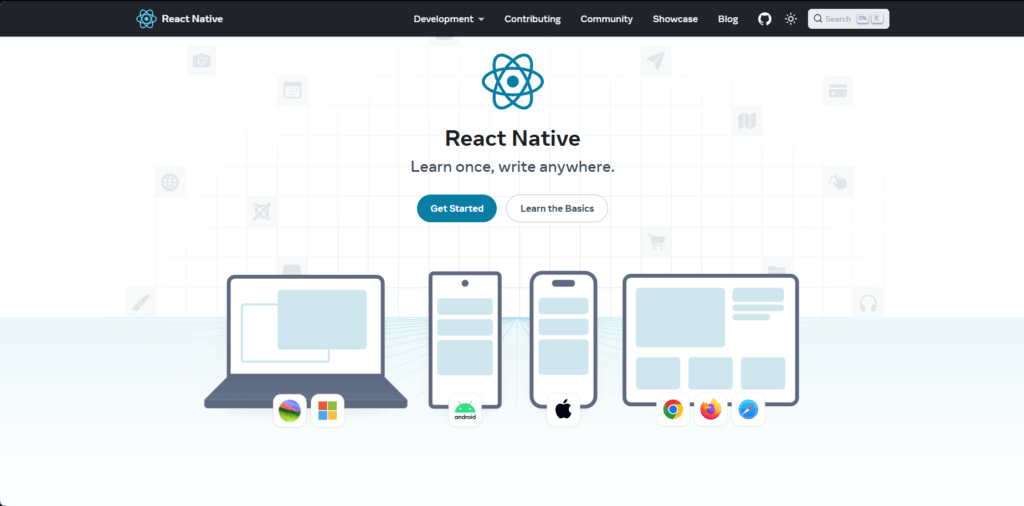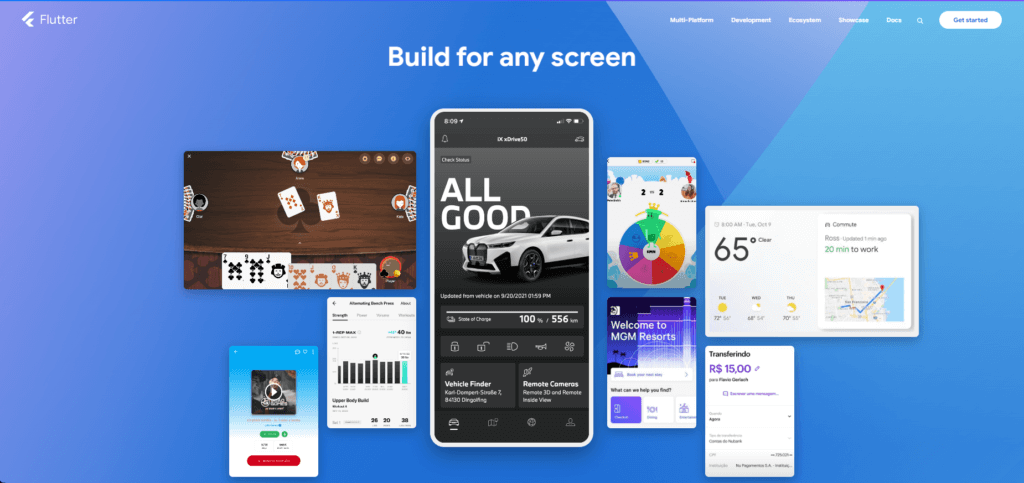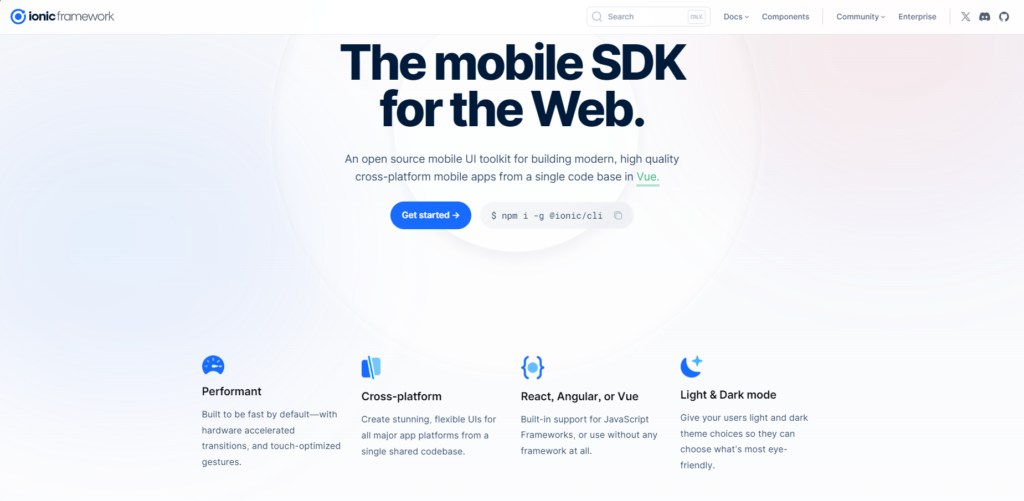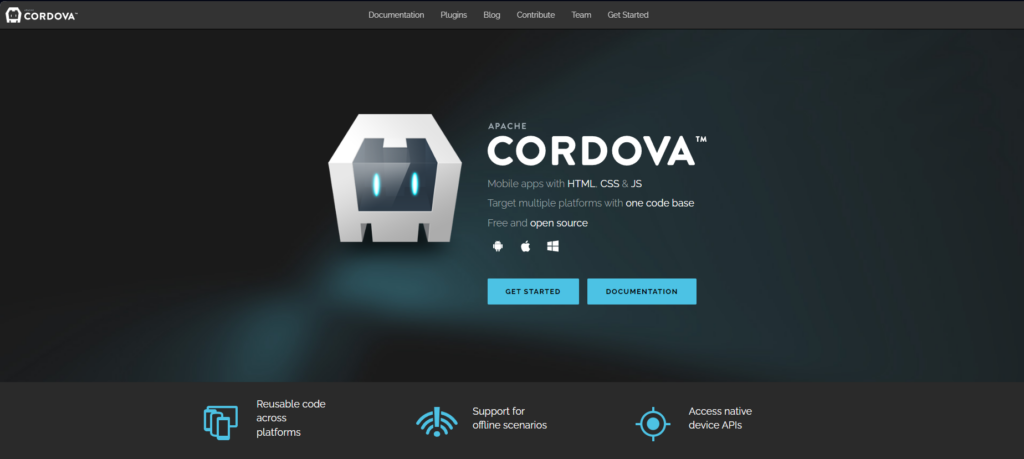Multiplatform app development is one of the best choices when creating your own applications. By sharing one codebase across multiple platforms, you can save a lot of time and money. Once you decide to create your application using this approach, you might ask yourself: What is the best framework for multiplatform app development?
That’s where we come in to help. Our list includes five of the best frameworks you can use during the app development process, and we will describe each one while also considering the advantages and challenges of each platform.
Leader in Multiplatform App Development Frameworks – React Native

When it comes to multiplatform app development, React Native consistently stands out as the leading framework. Backed by Facebook and a robust open-source community, React Native enables developers to build highly performant apps for both iOS and Android using a single codebase.
This framework is known for its near-native user experience, leveraging JavaScript and React’s powerful component-based architecture to deliver smooth, fast, and responsive apps. Around 25% of the most popular applications in Food and Drinks, Finance and Shopping categories are created in React Native.
Benefits of Using React Native
React Native shines as a top-tier option in multiplatform app development due to its versatile capabilities. Its component-based structure facilitates seamless UI customization, offering a native-like experience. Moreover, utilizing JavaScript, one of the most widely used programming languages, enhances developer productivity and eases onboarding for new team members. Here are some other benefits of this framework:
- Seamless integration with native code: When necessary, React Native allows developers to write portions of the app in native code
- Reusable Components: React Native uses a component-based architecture similar to React, making it easy for developers to reuse components across different parts of an application
- Proven Framework Backed by Major Companies: React Native is trusted by major tech companies like Facebook, Instagram, Airbnb, and Uber Eats, proving its scalability and reliability in handling complex, high-traffic applications.
Best Framework for Multiplatform App Development?
While opinions may vary, many developers consider React Native the best framework for multiplatform app development. Its large community support bolsters rapid problem-solving and a continuous stream of updates and improvements. Additionally, React Native's ability to integrate with native components allows for the enhancement of existing apps, making it a perfect choice for developers of multiplatform apps.
Challenges with React Native
Despite its strengths, React Native does face challenges. These include issues with performance in comparatively resource-intensive applications and a lesser degree of support for complex animations or transitions. Moreover, the reliance on third-party libraries can introduce variability in app quality.
However, a good development team will find a way to make the app's performance as good as a native one without compromising anything else in the product.
Flutter as a Strong Contender in Multiplatform App Development

While Flutter is a newer player in the multiplatform app development space compared to React Native, it has quickly established itself as a strong contender. Developed by Google, Flutter offers a unique approach to building apps with a focus on delivering a highly customizable UI and smooth performance across platforms.
Although it currently lags behind React Native in terms of the number of apps developed—React Native powers over 24,000 apps on the Google Play Store alone, compared to Flutter’s 14,000 apps—Flutter’s rapid growth and increasing adoption cannot be overlooked.
Biggest Upsides of Flutter
Flutter has established itself as a top choice for multiplatform app development. A key feature is its Skia graphics engine, which ensures smooth rendering and high performance across platforms. This engine enables the framework to provide consistent and fast UI rendering, resulting in seamless animations and a fluid user experience.
Flutter's use of a rich set of pre-designed widgets enables the generation of visually appealing UI-s. Those interfaces feel exactly the same on both Android and iOS. That's why it is an attractive choice for those looking to develop cross-platform apps.


Native Components - Problems of Google’s Framework
However, Flutter is not without its limitations. While it offers extensive customization options, integrating with native components often presents challenges, especially for complex functions. Developers may face hurdles when trying to access specific native features on iOS or Android, which can slow down the development process.
Here are some other challenges that you might need to consider when choosing Flutter:
- Dart Language: Flutter uses Dart, which is a language that many developers are unfamiliar with.
- Large App Size: Framework includes the Dart runtime and the entire engine, which adds overhead to the app size.
- Limited Support for Older Devices: Flutter engine is optimized for modern devices, which may lead to suboptimal performance on older hardware.
Do you want to learn more about this platform? Check out Flutter's official webpage.
A Microsoft Solution for Cross Platform App Development - Xamarin (.NET MAUI)
Google has Flutter, Facebook has React Native, and Microsoft also offers a powerful solution for multiplatform app development. Xamarin, previously one of the most popular frameworks for cross-platform development, has been evolving.
As of May 2024, Xamarin has been fully merged into .NET MAUI (Multi-platform App UI), which is the new framework within the .NET ecosystem. .NET MAUI provides a unified experience for building apps across iOS, Android, Windows, and macOS, ensuring long-term support and more modern features.

Advantages of Using Xamarin for Multiplatform App Development
Xamarin is recognized as a reliable solution for cross-platform app development mainly due to its seamless integration with the Microsoft ecosystem. One of the advantages of using Xamarin is using C#, a sophisticated yet accessible programming language. The main benefits of this technology are:
- Access to Xamarin Essentials: Xamarin Essentials is a library that provides cross-platform APIs for common mobile features (such as GPS, sensors, file access, etc.) without needing platform-specific code.
- Native UI: Xamarin ensures the UI matches the native design guidelines for each platform, which can be critical for certain applications that need to look and feel truly native.
- Strong Community: Xamarin has been supported by Microsoft for many years, and its ecosystem includes strong documentation and a large developer community.
Performance Limitations – Is Xamarin Still Worth Using?
Nevertheless, some performance limitations exist with Xamarin, particularly in apps that require high-end graphics or intensive data processing. The overhead associated with binding and the abstraction layer can make Xamarin less optimal for such cases. Consequently, you must carefully evaluate project requirements against Xamarin’s capabilities to determine its suitability for multiplatform app development.
Building Multiplatform Apps with Ionic

Ionic is an open-source framework created by Max Lynch, Ben Sperry, and Adam Bradley of Drifty Co. in 2013. It was originally designed to build mobile apps using web technologies like HTML, CSS, and JavaScript. Since then, Ionic evolved into a powerful solution for creating high-performance, cross-platform application.
Strengths of Using Ionic
Ionic provides a unique approach to multiplatform app development by focusing on web technologies like HTML, CSS, and JavaScript. This makes it easier for web developers to transition into mobile app development, enabling teams to develop multiplatform mobile apps swiftly. Ionic’s rich library of ready-to-use components enhances productivity, allowing developers to create responsive and visually appealing interfaces quickly. Here are two other reasons why Ionic is considered a Top 5 Multiplatform App Development framework:
- Active Community and Extensive Documentation: Ionic developers have access to a wealth of tutorials, forums, and resources that make troubleshooting and learning easier.
- Seamless Integration with Popular Frontend Frameworks: Ionic integrates smoothly with well-known frontend frameworks like Angular, React, and Vue, giving developers flexibility in choosing the framework they are most comfortable with.
Performance Problems and Limitations in Native Functionality
On the other hand, relying heavily on web technologies can result in performance issues compared to fully native applications. Additionally, some native functionalities may not be entirely supported, creating a gap between what developers want to achieve and what is possible. Understanding these potential drawbacks is vital when assessing which framework aligns best with your project goals.
If you want to learn more, check out Ionic's webpage.
Creating Cross Platform Apps using Apache Cordova

Apache Cordova, originally developed by Nitobi and later acquired by Adobe in 2011, is an open-source framework that enables developers to build cross-platform mobile applications using standard web technologies like HTML, CSS, and JavaScript.
As one of the pioneers in the multiplatform development space, Cordova has been widely adopted by developers and continues to be a foundation for many multiplatform mobile app frameworks, including Ionic.
Getting Started with Apache Cordova
Apache Cordova remains a popular choice for building cross-platform apps, especially for those who want to leverage their existing web development skills. By wrapping web applications in a thin native layer, developers can create cross-platform mobile apps using standard web technologies.
Since Apache Cordova is both well-established and widely used, it benefits from strong community support. This can greatly assist developers in troubleshooting and overcoming challenges. Additionally, it offers a vast plugin ecosystem, enabling developers to easily integrate device-specific features and third-party services.
Compatibility Issues - Difficulties of Apache Cordova
Apache Cordova is not without its complications. Compatibility issues can arise from various mobile platforms and their respective updates, leading to increased maintenance efforts. Moreover, relying on plugins for accessing native features raises concerns around the stability and support of those plugins. It's essential to consider these factors when deciding on Apache Cordova as a solution for multiplatform app development.

FAQ: Common Questions About Multiplatform App Development
What is multiplatform app development?
Cross platform mobile app development refers to the process of creating applications that run on multiple platforms, such as iOS and Android, with a shared codebase. This approach allows businesses to reach a broader audience without duplicating efforts.
What are the biggest benefits of cross-platform app development?
The primary benefits of cross-platform app development include reduced development costs and time, the ability to share code across platforms, and access to a wider user base.
Which framework should I choose for multiplatform app development?
Choosing the right framework depends on your project's specific needs, including performance requirements, UI complexity, and team expertise. The most popular framework used for cross-platform apps is React Native, and we would recommend choosing it.
When should I decide to create multiplatform app?
Consider creating multiplatform apps when you aim to reach a diverse audience across various devices with limited resources. Additionally, if your project's core functionality can benefit from sharing a single codebase, multiplatform app development is a smart strategy.
By comprehending the strengths, challenges, and unique offerings of various frameworks available in multiplatform app development, technical managers can make informed choices that align with their organizational objectives and project requirements.






